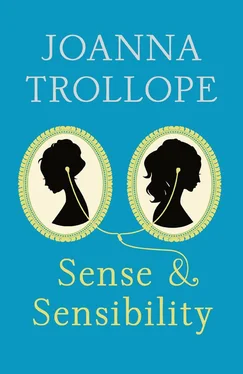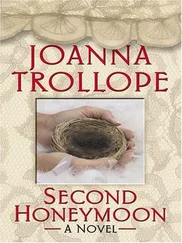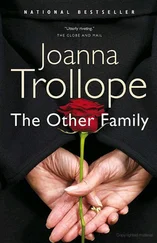When John had first brought Fanny to meet them, Elinor had thought that nobody so tiny could represent any kind of force. How wrong she’d been! Fanny had turned out to be a pure concentration of self-interest. She was, apparently, just like her equally tiny mother: hard as nails and entirely devoted to status and money. Especially money. Fanny was mad about money. She’d come to her marriage to John with some money of her own, and she had very clear ideas about how to spend it. She had, in fact, very clear ideas about most things – and a will of iron.
Fanny had wanted a man and a big house with land and lots of money to run it and a child, preferably a boy. And she had got them. All of them. And nothing, absolutely nothing, was going to stand in the way of her keeping them and consolidating them. Nothing.
It was outrageous, really, how soon after Dad’s death that Fanny came bowling up the drive in her top-of-the-range four-by-four Land Cruiser with Harry in his car seat and the Romanian nanny and the kind of household luggage you only bring if you want to make it very, very plain who’s the boss round here now. She brought a bunch of garage forecourt flowers – they even had a sticker on the cellophane wrapping saying 20 per cent more for free – for Belle and then she said would they mind awfully just staying in the kitchen wing for a few hours as she had her London interior designer coming and he charged so much for every hour that she really wanted to be able to concentrate on him.
So they’d taken Harry and the nanny, who had blue varnished nails and a leopard-print miniskirt stretched over her considerable hips, into the kitchen, and tried to give them lunch, but the nanny said she was dieting, and would only have a smoke, instead, and Harry glanced at the food on the plate and then put his thumb in, and closed his eyes in disgust. It was three hours before Fanny, her eyes alight with paint-effect visions, had blown into the kitchen and announced, without any preliminary and as if it would be unquestionably welcome news, that she and John would be moving in in a fortnight.
And they had. So silly, Fanny said firmly, as if no one could possibly disagree with her, so silly to go on paying rent in London when Norland was simply standing waiting for them. She seemed entirely oblivious to the effect that she was having, and to the utter disregard she displayed for what she was doing to the family for whom Norland had been more home than house for all their childhood years. Her ruthless determination to obliterate the past life of the house and to impose her own expensive and impersonal taste upon it instead was breathtaking. Out with the battered painted furniture, the French armoires, the cascading and faded curtains in ancient brocades, and in with polished granite and stainless steel and state-of-the-art wet rooms. Out with objects of sentimental value and worn Persian rugs and speckled mirrors in dimly gilded frames, and in with modern sculptured ‘pieces’ and stripped-back floors and vast flat television screens over every beautiful Georgian fireplace.
It was all happening too, it seemed to Belle and her daughters, with an indecent and brutal haste. Fanny arrived with John and Harry and the nanny, and an army of East European workmen, and took over all the best rooms, all the rooms that had once been Uncle Henry’s, and the house resounded to the din of sawing and hammering and drilling. Luckily, Elinor supposed, it was summer, so all the windows and doors could be opened to let out the inevitable dust and the builders’ smells of raw wood and plaster, but the open windows also meant that nothing audible could be concealed, especially not those things which Elinor grew to suspect Fanny of absolutely intending to be overheard.
They’d heard her, all the last few weeks, talking John out of any generous impulse he might have harboured towards his stepmother and half-sisters. Fanny might be tiny but her voice seemed to carry for miles, even when she was whispering. Usually, they could hear her issuing instructions (‘She never says please,’ Margaret pointed out, ‘does she?’) but if she wanted to get something out of John, she wheedled.
They could hear her, plainly, in their kitchen from the room she had commandeered as a temporary sitting room – drawing room, she called it – working on John. She was probably on his knee a lot of the time, doing her sex-kitten thing, running her little pointed fingers through his hair and somehow indicating that he would have to forgo a lot of bedroom treats if she didn’t get her way.
‘They can’t need that much, Johnnie darling. They really can’t! I mean, I know Mags is still at school – frightfully expensive, her private school, and really such a waste of money when there’s a perfectly adequate state secondary, in Lewes, which is free – but Elinor’s nearly qualified and Marianne jolly well ought to be. And Belle could easily go back to work, teaching art, like she used to.’
‘She hasn’t for yonks,’ John said doubtfully. ‘Not for as long as I can remember. Dad liked her at home …’
‘Well, darling, we can’t always have what we like, can we? And she’s had years, years, of just wafting about Norland being all daffy and artistic and irresponsible.’
There was a murmur, and then John said, without much conviction, ‘I promised Dad—’
‘Sweetness,’ Fanny said, ‘listen. Listen to me. What about your promises to me? What about Harry? I know you love this place, I know what it means to you even if you’ve never lived here and you know I’ll help you restore it and keep it up. I promised you, didn’t I? I promised when I married you. But it’s going to cost a fortune. It really is. The thing is, Johnnie, that good interior designers don’t come cheap and we agreed, didn’t we, that we were going to go for gold and not cut corners because that’s what a house like this deserves ?’
‘Well,’ John had said uneasily, ‘I suppose …’
‘Poppet,’ said Fanny, ‘just think about us . Think about you and me and Harry. And Norland. Norland is our home .’
There’d been a long pause then.
‘They’re snogging,’ Margaret said disgustedly. ‘She’s sitting on his lap and they’re snogging .’
It worked, though, the snogging; Elinor had to give Fanny credit for gaining her ends. The house, their beloved home which had acquired the inimitable patina of all houses which have quietly and organically evolved alongside the generations of the family which has inhabited them, was being wrenched into a different and modish incarnation, a sleek and showy new version of itself which Belle declared, contemptuously, to resemble nothing so much as a five-star hotel. ‘And that’s not a compliment. Anyone can pay to stay in a hotel. But you stay in a hotel. You don’t live in one. Fanny is behaving like some ghastly sort of developer. She’s taking all this darling old house’s character away.’
‘But’, Elinor said quietly, ‘that’s what Fanny wants. She wants a sort of showcase. And she’ll get it. We heard her. She’s got John just where she wants him. And, because of him, she’s got Norland. She can do what she likes with it. And she will.’
An uneasy forced bonhomie hung over the house for days afterwards until yesterday, when John had come into their kitchen rather defiantly and put a bottle of supermarket white wine down on the table with the kind of flourish only champagne would have merited and announced that actually, as it turned out, all things being considered, and after much thought and discussion and many sleepless nights, especially on Fanny’s part, her being so sensitive and affectionate a person, they had come to the conclusion that they – he, Fanny, Harry and the live-in nanny – were going to need Norland to themselves.
Читать дальше
Конец ознакомительного отрывка
Купить книгу


![Джейн Остин - Sense and Sensibility [С англо-русским словарем]](/books/26612/dzhejn-ostin-sense-and-sensibility-s-anglo-thumb.webp)









